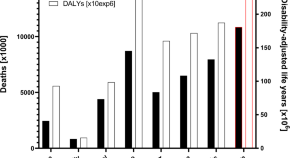
Collection
Special Issue: Impact of life style und behavioral risk factors on endothelial function and vascular biology
- Submission status
- Closed
There is increasing evidence that lifestyle and behavioral risk factors in the environment such as smoking and sedentary lifestyle may facilitate the development of chronic non-communicable disease of cardiometabolic origin. Tobacco smoking is a major trigger of chronic non-communicable disease and a risk factor for cardiovascular and lung disease. Whereas global tobacco use was reduced during the last two decades, mostly due to a reduction of female smokers, the use of E-cigarettes, novel nicotine delivery systems such as heat-not-burn products and waterpipes (shisha) shows a pandemic growth, especially due to flavoring of tobaccos and liquids, a lower starting age of users, facilitated usage or higher nicotine content causing faster addiction. Likewise, alcohol abuse is another lifestyle drug dependent cardiovascular health issue. Western societies and emerging market countries also face an increasing rate of people with sedentary lifestyle or over-nutrition, risk factors that are well-known to trigger cardiometabolic disease by impairment of beneficial vascular function. The present special issue provides an overview on health effects of tobacco cigarette and shisha smoking, E-cigarette vaping, usage of other novel nicotine delivery systems, sedentary lifestyle or over-nutrition with focus on negative effects on endothelial function and cardiovascular health. The adverse effects of the toxic constituents of these tobacco (replacement) products as well as the beneficial effects of exercise or fasting on different biological pathways will be discussed, especially regarding their impact on key vascular processes such as nitric oxide signaling, smooth muscle proliferation, remodeling, atherosclerosis, in part driven by oxidative stress and inflammatory cascades. With the present Special Issue we want to highlight the pathomechanisms underlying cardiovascular and metabolic disorders in response to environmental risk factors and the existing research gaps. We will also emphasize emerging mechanisms based on dysregulation of the circadian clock, the microbiome and epigenetic pathways by environmental lifestyle and behavioral risk factors.
Invited papers. Open submissions are also welcome.
Editors
-
Andreas Daiber
Center for Cardiology 1 University Medical Center Mainz, Germany
-
Omar Hahad
Center for Cardiology 1 University Medical Center Mainz, Germany
-
Thomas Münzel
Center for Cardiology 1 University Medical Center Mainz, Germany
Articles (12 in this collection)
-

-
Regulation of endothelial function by cigarette smoke and next-generation tobacco and nicotine products
Authors (first, second and last of 5)
- Justus Klein
- Patrick Diaba-Nuhoho
- Henning Morawietz
- Content type: Review
- Open Access
- Published: 07 June 2023
- Pages: 835 - 844

-
The role of acrolein for E-cigarette vapour condensate mediated activation of NADPH oxidase in cultured endothelial cells and macrophages
Authors (first, second and last of 9)
- Ivana Kuntic
- Marin Kuntic
- Andreas Daiber
- Content type: Original Article
- Open Access
- Published: 07 June 2023
- Pages: 807 - 821

-
Exercise and vascular function in sedentary lifestyles in humans
Authors
- Babatunde Fasipe
- Shunchang Li
- Ismail Laher
- Content type: Review
- Published: 05 June 2023
- Pages: 845 - 856

-
Editorial: Special issue: “Impact of lifestyle und behavioral risk factors on endothelial function and vascular biology”—how lifestyle and behavioral risk factors affect the vasculature
Authors
- Andreas Daiber
- Omar Hahad
- Thomas Münzel
- Content type: Editorial
- Open Access
- Published: 04 June 2023
- Pages: 777 - 781

-
Alcohol and the vasculature: a love-hate relationship?
Authors
- Huige Li
- Ning Xia
- Content type: Review
- Open Access
- Published: 11 May 2023
- Pages: 867 - 875

-
E-cigarette effects on vascular function in animals and humans
Authors (first, second and last of 5)
- Andreas Daiber
- Marin Kuntic
- Thomas Münzel
- Content type: Review
- Open Access
- Published: 21 April 2023
- Pages: 783 - 796

-
Comparative study of the effects of cigarette smoke versus next-generation tobacco and nicotine product extracts on inflammatory biomarkers of human monocytes
Authors (first, second and last of 7)
- Sindy Giebe
- Melanie Brux
- Coy Brunssen
- Content type: Original Article
- Open Access
- Published: 21 April 2023
- Pages: 823 - 833

-
Dietary supplements and vascular function in hypertensive disorders of pregnancy
Authors (first, second and last of 4)
- Andy W C Man
- Yawen Zhou
- Huige Li
- Content type: Review
- Open Access
- Published: 12 April 2023
- Pages: 889 - 905

-
Maternal nutrition and effects on offspring vascular function
Authors (first, second and last of 4)
- Taylor A. Ricci
- Nicha Boonpattrawong
- Angela M. Devlin
- Content type: Review
- Published: 12 April 2023
- Pages: 877 - 887

-
Pathological mechanisms of cigarette smoking, dietary, and sedentary lifestyle risks in vascular dysfunction: mitochondria as a common target of risk factors
Authors
- Sergey I. Dikalov
- Sergey Gutor
- Anna E. Dikalova
- Content type: Review
- Published: 30 March 2023
- Pages: 857 - 866

-
Tobacco smoking and vascular biology and function: evidence from human studies
Authors (first, second and last of 5)
- Omar Hahad
- Marin Kuntic
- Thomas Münzel
- Content type: Original Article
- Open Access
- Published: 24 March 2023
- Pages: 797 - 805



